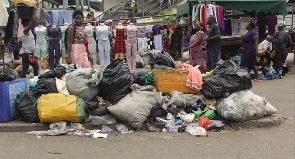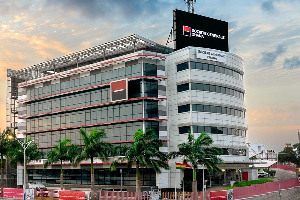Opinions of Wednesday, 25 October 2023
Columnist: Joseph Marfo
‘Borla’ producing unbearable stench takeover Kumasi, KMA Mayor looks on
Kumasi, the bustling trading city of Ghana, is currently grappling with a mounting challenge in waste management. With the population steadily increasing, the city is struggling to keep up with the proper disposal of waste.
One of the most prominent and urgent issues is the proliferation of refuse heaps, known as "Borla," scattered throughout the city. These refuse heaps are frequently found in residential areas and street corners, particularly in the main business centres such as Adum, Kejetia, and Dr. Mensah. They have become an all-too-familiar sight for the residents of Kumasi.
These towering mounds of waste not only mar the city's aesthetic appeal but also emit an unbearable stench that permeates the air, adversely affecting the daily lives of residents, government and private workers, as well as sellers and buyers. The refuse heaps are not only an eyesore but also pose significant environmental and health hazards to the community.
Causes
The overwhelming stench emanating from the refuse heaps, drains, and gutters in Kumasi is a direct result of improper waste disposal practices. These practices include indiscriminate dumping, inadequate waste collection materials such as dustbins, and a lack of proper waste supervision by the Kumasi Metropolitan Assembly (KMA).
Despite numerous complaints from traders, buyers, travellers, and the workforce from both government and private institutions, the authorities of KMA, led by Mr. Samuel Pyne, seem to have no solution to this pressing issue. As a result, piles of garbage continue to accumulate in various parts of the city.
Dangers
The dangers associated with these refuse heaps are significant. They pose severe environmental hazards, contaminating the air, water, and soil. The decomposition of organic waste releases harmful gases, contributing to air pollution. Additionally, these heaps often contaminate nearby water bodies, leading to the spread of waterborne diseases.
Furthermore, these refuse heaps serve as breeding grounds for disease-carrying pests, such as rats, flies, and mosquitoes. These pests can transmit various diseases, including malaria, dengue fever, and cholera. The stench in Kumasi not only poses significant health risks but also negatively impacts the quality of life for its residents. Prolonged exposure to such odours can lead to respiratory issues, headaches, and nausea.
Short Solution
To combat this issue, the city could consider investing in advanced waste management technologies and infrastructure. This could include the establishment of waste treatment plants, recycling facilities, and the promotion of sustainable waste disposal practices. Additionally, raising awareness among residents about the importance of proper waste management and encouraging their active participation in waste reduction initiatives could make a significant difference.
Furthermore, collaboration between the government, private sector, and community organizations is essential to tackle this challenge collectively. By working together, Kumasi can develop innovative and sustainable solutions that not only address the immediate waste management crisis but also pave the way for a greener and more prosperous future.
The time for action is now!













